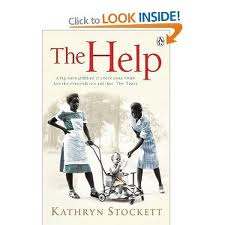Let’s all gather round my virtual fire and have a lovely cosy chat about our latest Book Club offering, The Help by Kathryn Stockett. That’s right, pull up a chair, let me pour you a cup of tea and pass you a slice of coffee and walnut cake, just to get the thought processes going on this chilly day.
I really enjoyed this book. It was an easy read, on a hard subject. It deals with the servants hired by rich women in the southern states of America in the 1960s. Not to beat about the bush, the maids are black, the employers are white. The story is told by two of the maids, and a daughter of one of the wealthy families. The daughter, Skeeter, realises when her own maid disappears one summer just how much she owes this woman, who has virtually brought her up. Meanwhile Skeeter’s actual mother makes no effort to understand her daughter and spends her days trying to marry her off, without much thought to her chances of happiness.
I was astonished to hear that this assured work is Stockett’s first novel, and even more surprised to learn that she was turned down by 60 literary agents before she found someone to represent her. Then, when I thought about it a bit harder, I realised that the race issue is still virtually untouchable in the US, and very thorny also in the UK. Would a similar book frighten the horses here in Britain? Probably, if it was written by a white woman, as The Help was.
What a dream come true for Stockett, whose book, rejected by so many, has now sold zillions and been made into a film. It is, of course, the fantasy happy ending every struggling novelist secretly prays for – including this one!
But I’m wandering away from the novel. I liked the first person narrative style, making each story personal and compelling. For me, though, the book risked becoming saccharine, but was saved by the abrasive character of Minny, who has been sacked by 19 employers, and I’m afraid , while sympathising and rooting for Minny all the way, you can completely see why she was let go so many times. Of course, the final part of the novel, which I won’t reveal (hoping you haven’t already seen the film) is immensely satisfying as a result.
All in all, a great book, and one I’d thoroughly recommend for the Christmas holidays. I hope that Stockett is not too brow-beaten by the reception of the novel (she was sued by her brother’s maid and lambasted by various organisations) to stop. I’m dying to see what she comes up with next.


